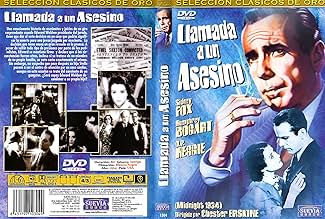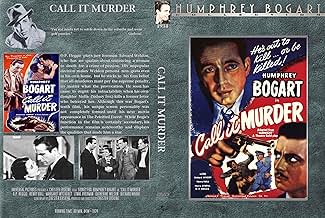Adicionar um enredo no seu idiomaThe foreman of a jury asks questions that send a woman to the electric chair for a murder committed in the heat of passion. On the night of the execution, his actions come back to haunt him.The foreman of a jury asks questions that send a woman to the electric chair for a murder committed in the heat of passion. On the night of the execution, his actions come back to haunt him.The foreman of a jury asks questions that send a woman to the electric chair for a murder committed in the heat of passion. On the night of the execution, his actions come back to haunt him.
- Direção
- Roteiristas
- Artistas
- Joe Biggers
- (as Lynn Overman)
- Dist. Atty. Plunkett
- (as Moffat Johnson)
- Ingersoll
- (as Henry O'Neil)
- Jury Member
- (não creditado)
- Direção
- Roteiristas
- Elenco e equipe completos
- Produção, bilheteria e muito mais no IMDbPro
Avaliações em destaque
Although the story premise is very interesting, especially the subject about a man who feels a murderer must pay the price, only to have his own daughter commit the same kind of crime of passion, MIDNIGHT fails to deliver mainly because of stiff, stagy production with not so convincing dialog. Under capable hands of a more suitable director, for instance, William Wyler, for example, MIDNIGHT might have worked as a tense and moving drama. Sidney Fox, who usually gives a satisfactory performance, seems to be the weakest link here, talking somewhat shaky at times for no reason. She's not very convincing, especially during her emotional scenes. Occasionally the camera shots moving at different angles keeps the pace moving, but not enough to hold one's interest at 73 minutes.
Other capable members of the cast include Margaret Wycherly as Mrs. Weldon; future director Richard Wholf as Stella's brother, Arthur; Lynne Overman and Katherine Wilson as Joe and Ada Biggers, tenants of the Weldon household; Granville Bates, Cora Witherspoon, Henry O'Neill, and Moffatt Johnston as a district attorney who is called to the Weldon home to solve the mystery to Gar Boni's murder.
To capitalize on the success of future film star Humphrey Bogart, MIDNIGHT was later reissued in 1946 as CALL IT MURDER with Bogey being given star billing, the very print available to video cassette and DVD. It's the former Blackhawk Video Company of Davenport, Iowa, that distributed the movie on videotape with it's original "Midnight" title, opening credits headed by Sidney Fox, O. P. Heggie and Henry Hull, with Bogart's name listed eighth in the cast, as initially presented in theaters in 1934.
MIDNIGHT will never be listed in Hollywood's Top Ten Best list, but it's worth viewing for being an early screen appearance of future superstar Humphrey Bogart or a rediscovery of Sidney Fox, whose movie career (mostly at Universal) lasted only three years. Fox and Bogart had worked together earlier in THE BAD SISTER (1931), which not only became Fox's movie debut, but the future two-time Academy Award winning actress, Bette Davis. (***)
While the stage production disappointed the critics and was not extended beyond its initial subscription run (48 perf., December 29, 1930 - Feb. 1931 at the Guild Theatre), Claire and Paul Sifton's examination of the flaws in the idea that "the law is the law" regardless of justice or tempering with mercy was interesting enough to justify Universal's committing a cast from the top of their second tier to turning out a decent "programmer" to fill the demand for films to keep the screens they controlled occupied between their major releases and training stars in the making (like Bogart and Sidney Fox).
The original play concerned the foreman of a jury, a man named Edward Weldon (O.P. Heggie on screen), which had condemned a woman for the murder of a man who was leaving her - only to find, two acts later, his daughter (Fox) in a similar situation.
Director Chester Erskine (at the start of a career which would see well remembered work on such "A" releases as THE EGG AND I, ALL MY SONS and ANDROCLES AND THE LION, working as director, writer and producer for another 40 years), while unable to produce the figurative "silk purse" out of a possible "sow's ear" of a melodrama, opened up the play, originally set only in the Weldon living room, with excellent - and given the period, surprisingly sophisticated - crosscutting between the condemned woman, the daughter's developing affair and the moral quandary around the Weldon himself.
If the 30's structure of the argument may strike many as dated today, and the "deus ex machina" solution to one of Weldon's problems too pat to be genuinely satisfying, they probably are - but the elder Weldon's overly strict, unbending interpretation of his moral and civic obligations is hardly unknown today as an excuse for lack of thought or bigotry. A remake with more "modern" technique might indeed be well received, but the implicit melodrama would be just as blatant.
While Humphrey Bogart's role is a relatively small one (although it is woven through most of the film), it makes for legitimately fascinating viewing as a transitional role for the handsome actor who had been playing stage juveniles. He had had 15 Broadway roles in the 12 years - and 9 films in the three years - before making this film, but would only have two more Broadway credits afterward (but 66 films). His Gar Boni in MIDNIGHT is very well done in a more modern style than many around him (see the similar effect the young Helen Hayes achieved with the same then "fresh" realistic style in 1932's FAREWELL TO ARMS) before finding the "world weary" persona that won career-making acclaim for his "Duke Mantee" opposite Leslie Howard on Broadway and screen just two years later.
It may be of some interest that on stage, the supporting role of Arthur Weldon (played in the film by future director Richard Whorf) was created by actor/playwright Clifford Odets.
Finding a good print of MIDNIGHT or even CALL IT MURDER may not be easy, but the search may be worth it. Don't expect a polished "modern" film, and shallow film buffs who don't appreciate history or context will probably hate it, but true film connoisseurs shouldn't miss this one for what IS there.
Você sabia?
- CuriosidadesBased on the flop play, Midnight (1930). Drama. Written by Claire Sifton and Paul Sifton. Directed by Philip Moeller. Guild Theatre: 29 Dec 1930- Feb 1931 (closing date unknown/48 performances). Cast: Maud Allan, Glenn Anders (as "Bob Nolan"), Harold Bolton, Zena Colaer, Josephine Hull (as "Mrs. Weldon"), William R. Kane, Jack La Rue (as "Gar Boni"), Tom H.A. Lewis, Harriet E. MacGibbon (as "Ada Biggers"), Clifford Odets (as "Arthur Weldon"), James Parker, Frederick Perry, Francis Pierlot (as "Richard McGrath"), Charles Powers, Samuel Rosen, Neal Stone, Robert Strange, Fred Sullivan, Royal Dana Tracey, Louis Veda (as "Photographer"), Harold Vermilyea (as "Joe Biggers"), Linda Watkins. Produced by The Theatre Guild.
- Erros de gravaçãoDuring Stella and Gar's first meeting in the court room, audible clicks can be heard between their line.
- Citações
[first lines]
Ethel Saxon: You see, I loved him. I mean I loved him when... when he didn't love me anymore, day in and day out watching him get further and further away from me. I could see in his eyes when he looked at me... I could see he hated me, hated me because I needed him. Oh, I was so frightened, so mixed up. It's so horrible to see someone who's become part of you slipping away, slowly. To feel helpless and empty, lonely and frantic, wanting to do something, anything, anything to bring him back! To patch things up, to try to tie together the few remaining bits of happiness... and then, that awful day when he drew the money from the bank and I knew the end I'd been waiting for had come, that all my fears were realized, that he was going away. I went mad... he mustn't go away, he mustn't go! Anything to stop him, anything! That's all I wanted to do
[starts to weep]
Ethel Saxon: I didn't mean to kill him, I only meant to stop him, to stop him from going away.
- Versões alternativasIn the retitled version, "Call it Murder" Humphrey Bogart's billing is moved to above the title.
- ConexõesFeatured in Mind Games (1989)
Principais escolhas
- How long is Midnight?Fornecido pela Alexa
Detalhes
- Data de lançamento
- País de origem
- Idiomas
- Também conhecido como
- Call It Murder
- Locações de filme
- Empresas de produção
- Consulte mais créditos da empresa na IMDbPro
Bilheteria
- Orçamento
- US$ 1.000.000 (estimativa)
- Tempo de duração1 hora 16 minutos
- Cor
- Proporção
- 1.37 : 1
Contribua para esta página































